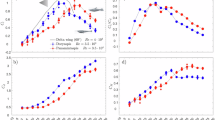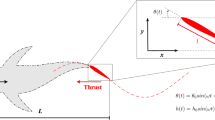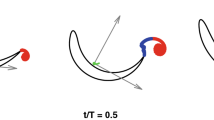Abstract
THE upward forces produced by the heterocercal tails of two species of Selachii, moving transversely through water at various speeds, have recently been measured1. It was found that the lift was approximately proportional to the 1.4th power of the transverse speed. The equilibrium of the fish, swimming horizontally, was discussed, and it was estimated that in each case the lift required for equilibrium would be obtained at swimming speeds around 0.5 body lengths/sec. At higher speeds, more lift would be obtained if the hypocaudal lobe acted passively, but it was thought probable that the lift could be adjusted to the required value by means of the radial muscles of the hypocaudal lobe.
This is a preview of subscription content, access via your institution
Access options
Subscribe to this journal
Receive 51 print issues and online access
$199.00 per year
only $3.90 per issue
Buy this article
- Purchase on SpringerLink
- Instant access to full article PDF
Prices may be subject to local taxes which are calculated during checkout
Similar content being viewed by others
References
Alexander, R. MCN., J. Exp. Biol., 43, 131 (1965).
Magnan, A., Ann. Sci. Nat. Zool., (Ser. 10), 12, 5 (1929).
Harris, J. E., J. Exp. Biol., 13, 474 (1936).
Author information
Authors and Affiliations
Rights and permissions
About this article
Cite this article
ALEXANDER, R. Lift produced by the Heterocercal Tail of Acipenser. Nature 210, 1049–1050 (1966). https://doi.org/10.1038/2101049b0
Issue date:
DOI: https://doi.org/10.1038/2101049b0



